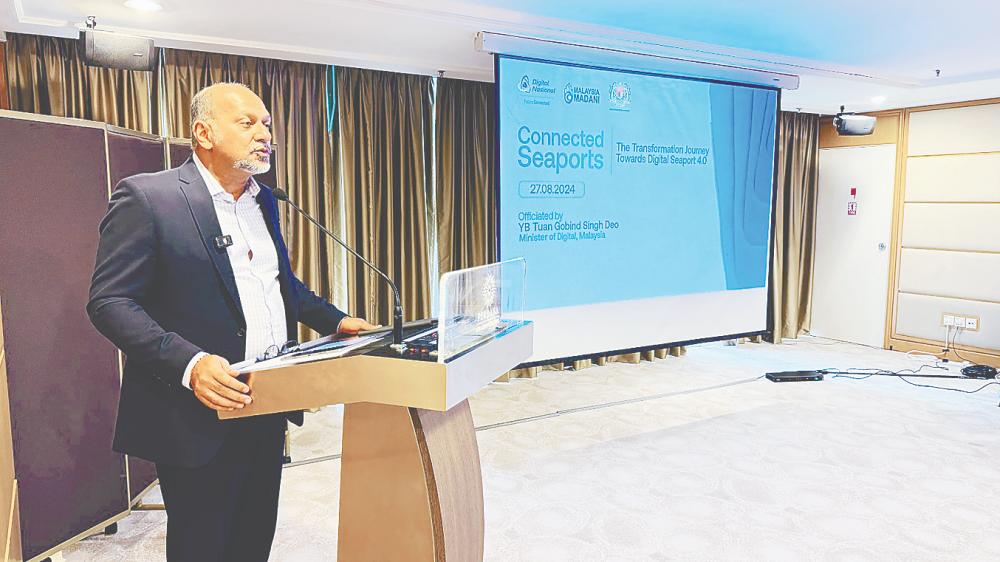KUALA LUMPUR: The government will keep pushing for the adoption of 5G and other advanced digital technologies to improve the country’s seaports and strengthen Malaysia’s position in the global maritime industry.
Digital Minister Gobind Singh Deo this push is part of its strategy to enhance Malaysian seaports’ competitiveness and efficiency on a global scale.
“At the opening ceremony of the Malaysia Maritime Week 2024 last month, our Prime Minister Datuk Seri Anwar Ibrahim called for the maritime industry to enhance its resilience and shared his aspiration for Malaysia’s seaports to be amongst the top 10 in the world,” Gobind said at the Connected Seaports Forum & Executive Roundtable themed “The Transformation Journey Towards Digital Seaport 4.0 – Advanced Technological Use Cases Powered by 5G” today.
Additionally, he said, the new Cybersecurity Act plays a crucial role in safeguarding Malaysia’s seaports.
“The new Cybersecurity Act will address the management of cybersecurity threats and incidents related to National Critical Information Infrastructure (NCII) and NCII Sector Leads, he added.
Gobind noted that seaports are included under the NCII definition, in compliance with international best practices.
“This means it is a sector that needs to consistently adhere to global cybersecurity standards,” he said.
Gobind urged Malaysian seaport operators to follow the footsteps of leading ports in China, Italy, and Spain, where 5G and Internet of Things integration has led to operational improvements and cost savings.
“Solutions powered by 5G connectivity, such as AI-enabled autonomous vehicles, video container inspection, predictive equipment maintenance and drone surveillance, can help Malaysia ports achieve faster turnaround time, better response to changes and ultimately, stay competitive,” he said.
He pointed out that Port Klang, comprising Northport and Westports, climbed two spots to 11th in the rankings of the world’s top 100 busiest container ports for 2023, according to the Lloyd’s List’s One Hundred Ports 2024 Report.
“I would like to congratulate you for that achievement, but at the same time, urge everyone to keep striving and climb even higher,“ Gobind said.
According to Malaysian Investment Development Authority, the maritime industry in Malaysia contributes about 40% of the country’s gross domestic product.
“For the record, over 90% of Malaysia’s exports are transported by sea. Efficient ports also reduce the cost of trade, making a nation’s goods more competitive in the global market,” Gobind said.
There is a need for a transformation of the seaport and maritime logistics sectors considering how fast the tech world evolves, he added.
“We live in an increasingly volatile, complex and ambiguous world. The global maritime industry was thrown into chaos in 2021, when the Suez Canal was blocked for six days by Ever Given, a 224,000-tonne container ship that had run aground in the canal,“ he said.
Gobind pointed to a BBC report which stated that the blockage held up some US$9.6 billion in global trade each day.
As to the Telekom Malaysia (TM) issue, Gobind said TM will not be prevented from appealing Digital Nasional Bhd’s decision to terminate the telco’s share subscription agreement (SSA).
“While we cannot stop Telekom from appealing, the decision made by DNB to terminate the SSA stands. They had asked for an extension of time which was granted, they were unable to comply within the extended time granted to them so the SSA between them and DNB was terminated. That is a matter between Telekom and DNB, not the ministry,” he said.
TM last week received a termination notice from DNB for the SSA signed on Dec 1, 2023 for a stake in DNB. This came after TM’s request and appeal for an “extension of the conditions precedent longstop date” were rejected. The request and appeal for another extension was for it to obtain shareholders’ approval at an extraordinary general meeting due to the SSA being a related party transaction.









